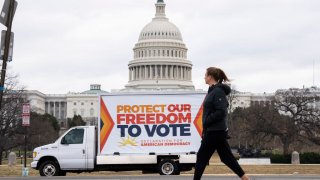If you steal a goat in Alabama you could permanently lose your right to vote. If you write a bad check in Mississippi, you might lose your voting rights for life. If you murder someone in Maine, you keep your voting rights — plus you’re allowed to vote from prison.
Voting as a right is not distributed equally to Americans. In California, residents are automatically registered to vote, voters receive ballots by mail, you can register to vote online and you're eligible for paid time off to cast a ballot. In Texas, voter registration is not automatic, and mail-in ballots are only available to some. Depending on where you live, voting is either an opt-in or an opt-out experience.
A Morning Consult poll from last summer found 44% of adults think voting regulations aren’t strict enough to prevent voter fraud. In that same survey, 33% said the process is too difficult for eligible citizens to vote. Reporter Eli Yokley at Morning Consult told NBCLX results were split by political and racial factors.
“We had four in five Republicans saying that the rules are too easy and they may allow fraud, whereas about half of [Democrats] said the rules are too hard," Yokley explained. "Among Black voters, two in five adults said the rules are too difficult, compared to a third of white voters, which means Black voters are seeing some of these challenges in a real way, as some of the Democratic voting rights activists have alleged.”
So, is voting too easy or not easy enough? Is our system broken or working just fine?
“When we’re talking about the electoral system in America, we’re really talking about 50 systems. Every state runs their own elections, and within that state, there may even be differences between municipalities [and] towns,” Lindsay Langholz, director of policy and programs at the American Constitution Society, told NBCLX.
“A lot of voters right now are facing obstacles that were designed to be obstacles. It’s not only voters of color — but certainly, predominantly voters of color — but also students, young voters who have these residency issues and trans voters who have ID issues. It has been designed to keep these voters from being able to get to the ballot box," she added.
The rules that vary between states make it difficult to get a comprehensive view of our election systems, so to better understand our ballot box disparities, NBCLX built an interactive map we’re calling the Ballot Accessibility Index. It’s a visual reference for comparing voting rights between states.
NBCLX's Ballot Accessibility Index
The methodology behind the index focused on nine factors:
- Access to automatic voter registration
- Access to online voter registration
- Proof of citizenship required to register to vote
- Voter ID laws
- Type of absentee voting available
- Options for early voting
- Felony disenfranchisement laws
- Guaranteed time off work to vote
- How polling places stay open
In states with the most accessible ballots…
- Residents are automatically registered to vote
- Ballots are distributed by mail
- People can vote at polling sites that stay open longer
- In-person voters aren't required to show an ID
- Early voting is available to everyone
- Absentee voting is available to everyone
- People convicted of felony crimes retain their right to vote
- Workers are given time off to vote
In states with the least accessible ballots…
- Voters have to show documentation that proves U.S. citizenship
- There is no automatic voter registration
- There is no option to register online
- Voters have to show photo ID to receive a ballot
- Voters must duplicate the signature on their ID to the satisfaction of poll workers
- Polling sites are open fewer hours
- There is no absentee voting
- There is no early voting
- People who complete a felony sentence lose voting privileges unless pardoned
“[The Ballot Accessibility Index] underscores just how much someone’s right to vote is dependent on their zip code right now," Langholz said. "[It] really shows the problems of ... if you’re moving 100 miles but it happens to be over a state line, it can determine how great of access you have to the ballot box, which is a shame."
“America has often been kind of this shining beacon of the democratic system, and that’s being noticed far and wide that we’re really in a moment of crisis right now," she added. "There are a lot of anti-democratic forces that are sending us backward and undoing some of the progress we’ve made since the civil rights movement.”


